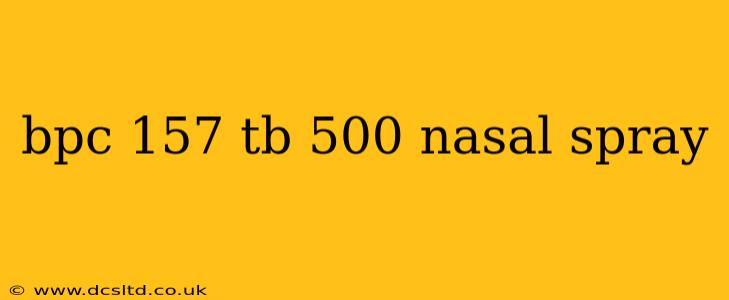The use of BPC-157 and TB-500, often administered via nasal spray, has gained significant traction in recent years within certain circles. However, it's crucial to approach this topic with caution and a thorough understanding of the available research and potential risks. This article will explore the purported benefits, potential side effects, and the current scientific understanding surrounding the nasal spray administration of these peptides. Remember, this information is for educational purposes only and should not be considered medical advice. Always consult with a healthcare professional before using any peptide therapy.
What are BPC-157 and TB-500?
BPC-157 (Body Protective Compound 157) is a pentadecapeptide (a short chain of 15 amino acids) initially isolated from the blood. Research suggests it may have potent wound-healing properties and may influence the gastrointestinal system. However, much of the research is pre-clinical and more human studies are needed to confirm its efficacy and safety.
TB-500 (Thymosin Beta-4) is another peptide naturally occurring in the body. It's believed to play a role in cell growth, wound healing, and inflammation reduction. Like BPC-157, the evidence for its therapeutic benefits is still developing, and more rigorous clinical trials are necessary.
Are BPC-157 and TB-500 Nasal Sprays Effective?
The effectiveness of nasal sprays containing BPC-157 and TB-500 is a subject of ongoing investigation. While some anecdotal evidence suggests potential benefits, the scientific community requires more robust clinical trials to definitively determine their efficacy. The nasal route of administration offers potential advantages in terms of absorption and bypassing the first-pass metabolism (liver), but absorption rates and bioavailability can vary significantly between individuals.
What are the Potential Benefits of BPC-157 and TB-500 Nasal Sprays?
While further research is needed, some potential benefits associated with BPC-157 and TB-500, regardless of administration method, include:
- Improved Wound Healing: Both peptides are being explored for their potential to accelerate wound healing, including tendon and ligament injuries.
- Reduced Inflammation: Preliminary research suggests both may help to reduce inflammation.
- Improved Gut Health: BPC-157 has shown promise in pre-clinical studies for improving gastrointestinal issues.
- Enhanced Muscle Recovery: TB-500's potential to promote tissue repair may aid in muscle recovery after strenuous exercise.
What are the Potential Side Effects of BPC-157 and TB-500 Nasal Sprays?
As with any peptide therapy, potential side effects exist, although generally considered mild in pre-clinical studies. These can include:
- Nasal Irritation: A common side effect of nasal sprays.
- Mild Headaches: Reported in some individuals.
- Allergic Reactions: Although rare, allergic reactions are possible.
Are BPC-157 and TB-500 Nasal Sprays Legal?
The legal status of BPC-157 and TB-500 varies depending on location. In many countries, they are not approved for human use and their sale and distribution may be regulated or restricted. Always check your local regulations before purchasing or using these peptides.
Where Can I Buy BPC-157 and TB-500 Nasal Sprays?
Due to the regulatory complexities surrounding these peptides, it's essential to exercise extreme caution when purchasing them. Only source these products from reputable suppliers who can provide verifiable proof of purity and safety. Avoid purchasing from unregulated online vendors, as the quality and purity of the product cannot be guaranteed.
Are BPC-157 and TB-500 Nasal Sprays Safe?
The long-term safety profile of BPC-157 and TB-500, especially through nasal administration, remains unclear due to limited long-term studies. It's crucial to consult a qualified healthcare professional before using these peptides.
What are the Differences Between BPC-157 and TB-500?
While both peptides share some overlapping properties in terms of wound healing and anti-inflammatory effects, they possess distinct mechanisms of action. BPC-157 primarily focuses on gastrointestinal and wound repair, while TB-500 exhibits a broader range of actions, influencing cell growth and angiogenesis (formation of new blood vessels).
Disclaimer: This information is for educational purposes only and should not be considered medical advice. Always consult with a qualified healthcare professional before starting any new treatment or using any peptide therapy. The author and publisher are not responsible for any actions taken based on the information presented in this article.
